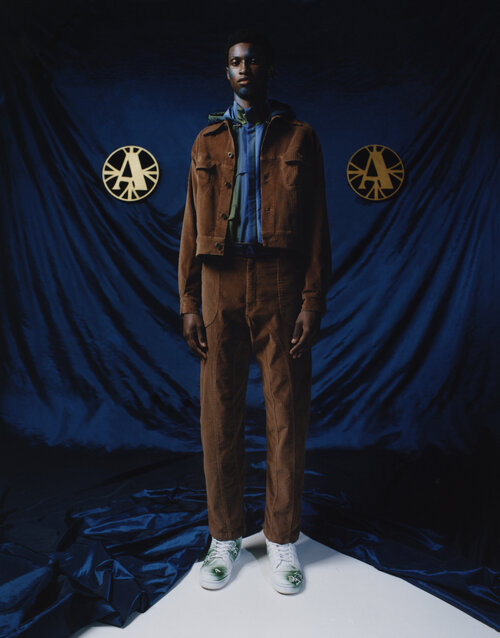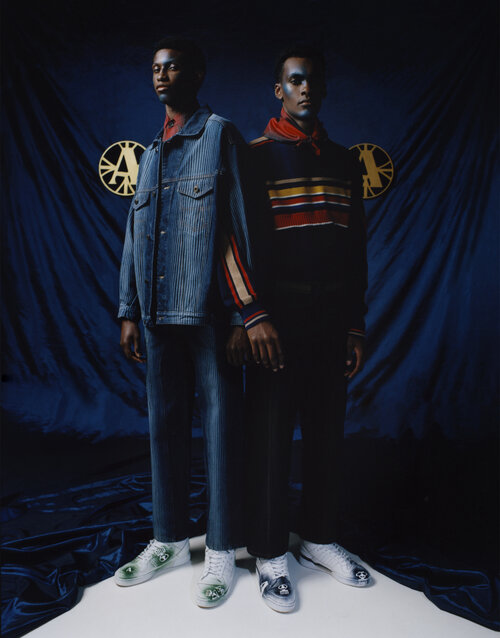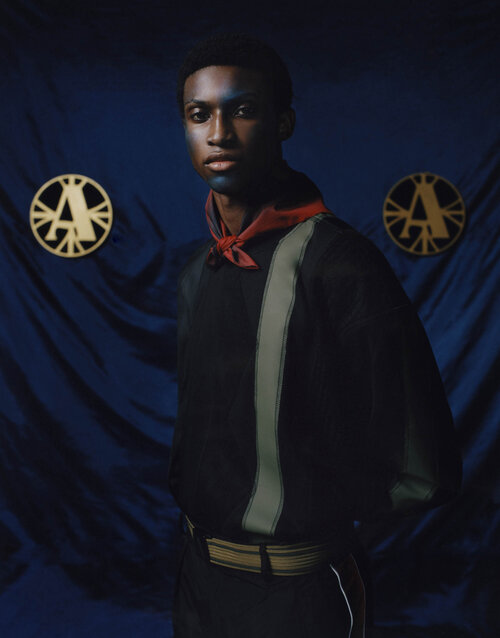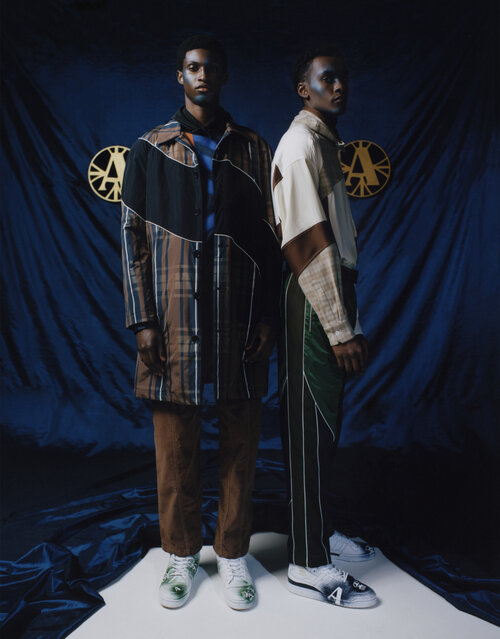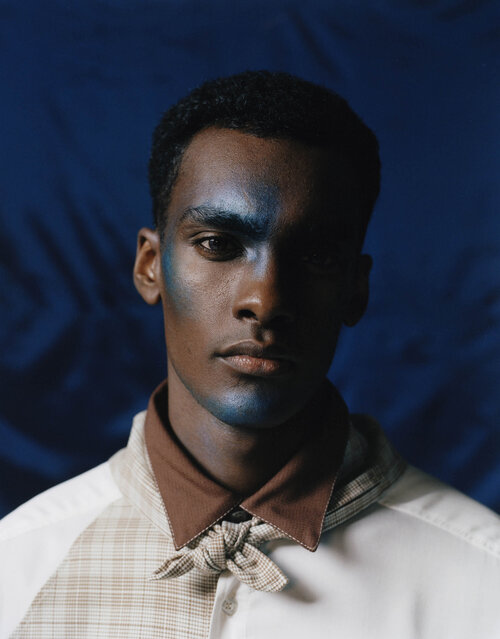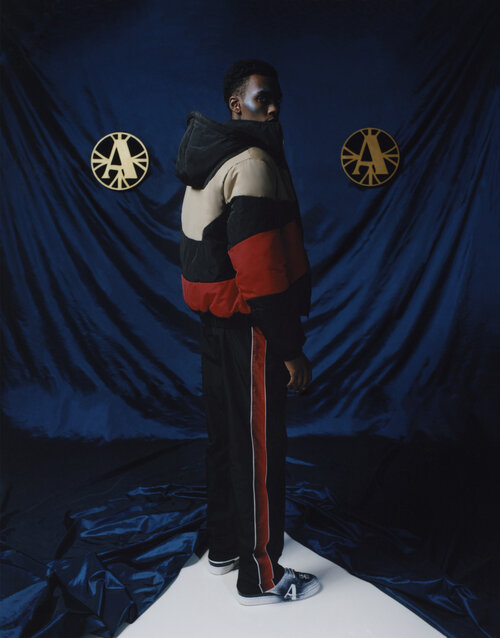London Fashion Week 2021 has been the talk of the town in the fashion industry, especially when it comes to the virtual reveal of designs. Amongst the many designers who have had to overcome the lack of a physical show is Priya Ahluwalia, who’s presented AW21 as a short film, Traces, in collaboration with musician Cktrl and director Stephen Isaac-Wilson.
Priya has explored her love of film as a medium for the Ahluwalia label ever since working with director Samona Olanipekun on her first film, Joy, shown as part of GucciFest. “I loved how so many people from around the world were able to engage with it in a way that doesn’t work with runway shows,” she says. Priya has triumphed once again, with Traces speaking volumes in terms of graceful movement, culture and fashion.
With physical travel a no-go, the irony of her latest collection is at large: “It’s ended up being all about travel and migration,” she chuckles. “I guess the heart wants what it can’t have!” The film opens up the viewer’s mind to these themes as valuable subject matters to focus on.
The designer became hugely inspired during the ongoing COVID-19 lockdown after juggling several books at once to fill her time. The research for the clothing started after reading Emmanuel Iduma’s A Stranger’s Pose and the award-winning novel Homegoing, by Ghanian-American author Yaa Gyasi. This led Priya to ponder the societal effects and cultural boom of migration; the events experienced by ancestors can affect descendants, and moving around the world can strongly affect what we do. “Things from the past always follow us around. It affects your mind, body, soul and spirit,” she states. Priya has utilized the mixing of cultures in order to create her most innovative and powerful collection to date.
Another key reference for AW21 was the Harlem Renaissance in the 1920s and the explosive influence of the ‘hybrid school of thought’. Priya notes, “Everything changed for Black people in America. It was integral to the development of new music, poetry, literature. I always found that time to be such a prime example of syncretism.”
Included in this dense web of references were two artists, Jacob Lawrence, painter of The Migration Series, and Kerry James Marshall. Their work depicts Black American life, translated in the collection’s grounding hues and ‘universal symbols of Blackness’; for example, migration maps, regional emerald jewellery and an Afro comb graphic pointing like a compass to the four corners of the world. Dark crew-neck sweaters come complete with tricolour cable-knit sleeves, and bleach-striped denim is paired with jigsaw-panelled brown corduroy trousers.
Traces marks Ahluwalia’s first collaboration with London-based filmmaker, Stephan Isaac-Wilson, known for his inventive interpretations on race, sexuality and intimacy. “When I came up with the initial idea for the film, it was actually with Stephen in mind to direct it,” Priya recalls. “I love Stephen’s films for his use of movement as well as music and I really knew he’d be perfect for this.” She shared her research, reading list and notes with her collaborators, for them to be able to add their take on it all.
Similarly, Priya had a producer, composer and multi-instrumentalist in mind when it came to music for the film. “When I knew I wanted to explore ideas of migration and movement, I was hoping Cktrl would be on board to star in the film and compose music for it,” she says. Cktrl has been signed by the likes of Virgil Abloh, Bianca Saunders and Beyoncé, following a cameo on her Black Is King project. Ahluwalia honours the whole process as “a really nice exchange of ideas.”
The film captures a united atmosphere of brotherhood, resorting back to ideas of family and ancestry. Thanks to choreography by Holly Blakey, the models dance in synchronized waves of movement to an exclusive piece of music, beautifully composed and performed by Cktrl on the saxophone. There’s a sense of respect, admiration and wonder as the models look up to Cktrl in awe whilst showcasing the expertly-made garments.
The 27-year-old is optimistic about the progress being made in the industry through the global fashion scene. “I’ve worked hard this season to try and design a collection that can be mixed and matched and would work for a global audience, so I’m looking forward to talking with buyers about it.” As an advocate for creative people of colour, she hopes “the future of fashion is more inclusive across all areas, and not just in public-facing jobs, such as modelling or designing but also in production, editorial roles and marketing.”
In addition to her well-deserved accolades, Priya has also recently won the Queen Elizabeth II Award for British Design, in recognition of her commitment to sustainable practices, diversity and design excellence. Praised for “her active contribution to changing the industry for the better,” she was presented the award by the Countess of Wessex on behalf of the Queen, which took place as a virtual ceremony due to pandemic restrictions.
Following in the footsteps of Richard Quinn, Bethany Williams and Rosh Mahtani of Alighieri, Priya is the fourth recipient to win the annual award amongst young designers striving to make the fashion industry more sustainable and inclusive. The British Fashion Council stated that Ahluwalia was chosen due to its craftsmanship and community. “Her sustainably minded menswear collections, made of dead stock and repurposed locally sourced vintage materials, combine elements and influences from her Nigerian and Indian heritage, making her designs truly unique.”
In conversation with British Vogue, she says, “It shows that fashion can be a vehicle for such positive things – it’s not vacuous or self-indulgent as stereotypes would lead people to believe; there is such good that can come of it. I’ve really tried to be a designer that creates interesting ways of communicating, whether that’s through books or films or virtual exhibitions, but doing all of that whilst trying to make the product in a way that causes the least harm to the planet. It can be, in some ways, regenerative – by making the clothes you’re putting good back.”
Although the digitalization of fashion shows has become the new normal, a return to physicality is long-awaited – for spectators, designers and Priya herself. “Lots of people keep saying that we’ll never have real shows again, but that’s like saying to the theatre world that they’re never going to stage plays again. There’s a place for human interaction in fashion, and that’s slightly missing right now.” All is not lost, however, as the talent and symbolism behind Ahluwalia’s collection is wonderfully translated through film. It connects with people, honouring the past with contemporary designs, which is very significant now and will remain to be so in future.
All images in this article are courtesy of Ahluwalia.
